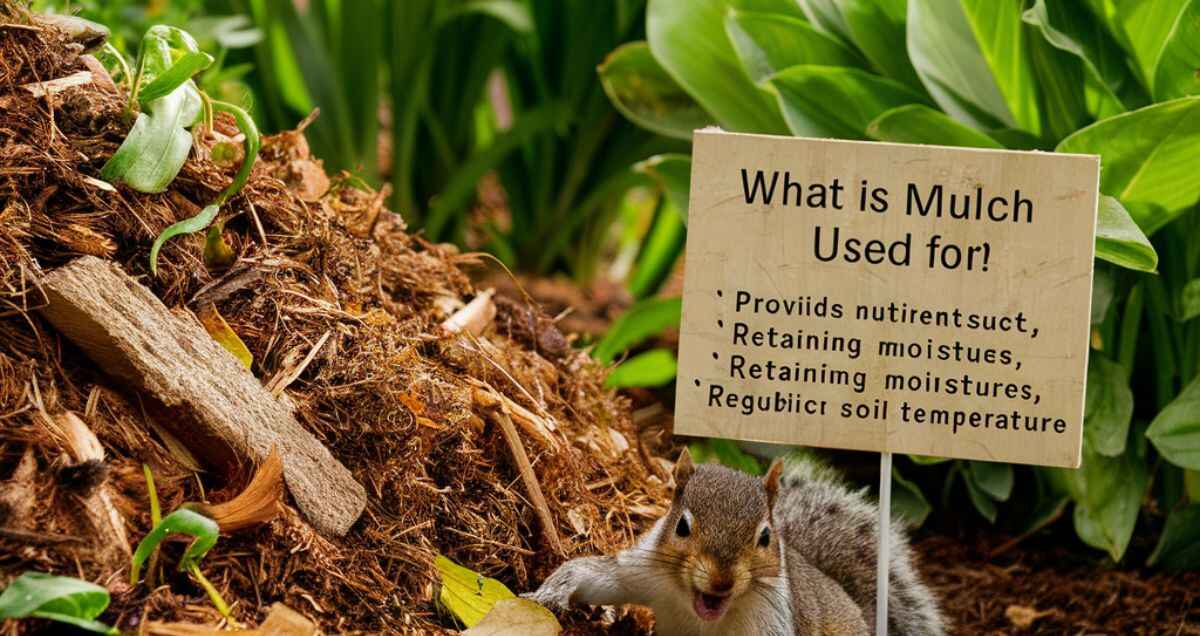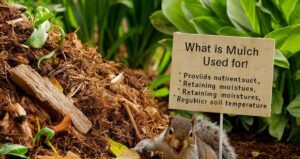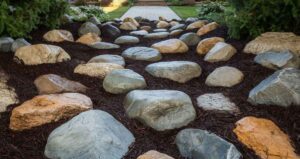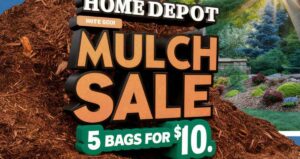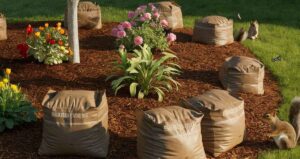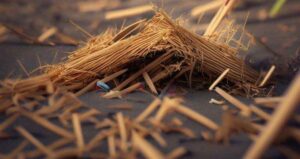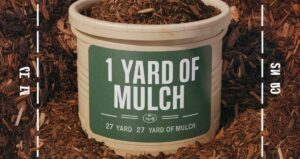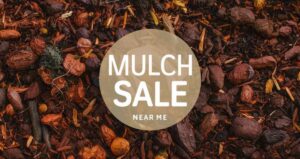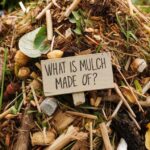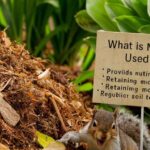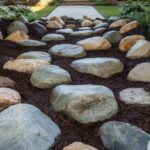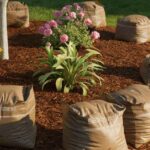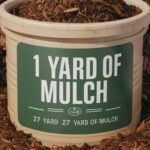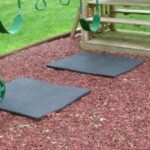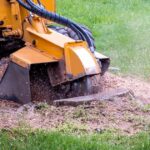A protective layer of material spreads on top of the soil to retain moisture, suppress weeds, insulate the soil, and enrich it as the mulch decomposes over time.
Nature’s ultimate gardening hack – mulch. This modest layer of organic material works wonders, conserving moisture, suppressing weeds, and enriching soil fertility over time. By harnessing the power of mulch, you unlock a low-maintenance path to a lush, vibrant outdoor oasis.
We will discuss, these topics: what is mulch and why should you use it?, choosing the right mulch for your garden, how to properly apply mulch, mulching for specific garden types, addressing common mulching concerns
What Is Mulch And Why Should You Use It?
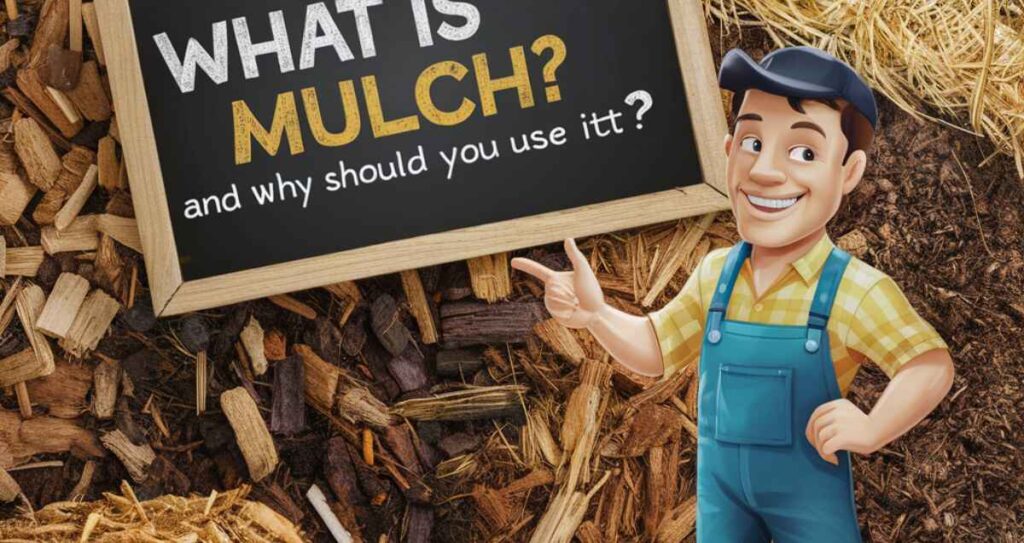
Mulch is a protective layer of material spread over the soil’s surface. Its primary purposes are:
Read This Article: Front Yard Landscaping Ideas With Rocks And Mulch
- Moisture Retention: Mulch acts as an insulating blanket, reducing evaporation and helping the soil retain precious moisture. This means less frequent watering is required, saving you time and resources.
- Weed Prevention: A thick layer of mulch blocks sunlight from reaching the soil, preventing weed seeds from germinating and taking over your garden beds.
- Temperature Regulation: Mulch moderates soil temperatures, keeping it cooler in the summer and warmer in the winter, protecting plant roots from extreme temperature fluctuations.
- Soil Enrichment: As organic mulches decompose over time, they release valuable nutrients into the soil, improving its structure and fertility.
By embracing mulching, you’ll create a lush, thriving garden and significantly reduce your maintenance workload. Imagine spending less time weeding, watering, and tending to your plants, and more time simply enjoying the beauty of your outdoor oasis.
Choosing the Right Mulch for Your Garden
When it comes to mulch, you have two main categories to choose from: organic and inorganic.
Organic Mulches
Organic mulches are derived from natural, biodegradable materials and are an excellent choice for most gardens. As they decompose, they add valuable nutrients and organic matter to the soil, improving its overall health. Some popular organic mulch options include:
- Wood Chips or Bark: These mulches are readily available and offer excellent moisture retention and weed suppression. They’re a great choice for trees, shrubs, and perennial beds.
- Leaves: A cost-effective and eco-friendly option, shredded leaves can be used as mulch in vegetable gardens and flower beds.
- Straw or Hay: These lightweight mulches are ideal for vegetable gardens, as they allow air and water to penetrate while suppressing weeds.
- Compost: A nutrient-rich option, compost mulch not only suppresses weeds but also provides a steady supply of organic matter to your soil.
Inorganic Mulches
While not as common, inorganic mulches can be useful in specific situations. These include:
- Rubber Mulch: Made from recycled tires, rubber mulch is long-lasting and can be used in playgrounds or high-traffic areas.
- Plastic Mulch: Often used in commercial agriculture, plastic mulches help retain moisture and warm the soil, but they don’t contribute to soil health and can be unsightly in home gardens.
- Rocks or Gravel: These inorganic options are suitable for pathways, rock gardens, or areas where you want a more permanent, decorative mulch.
When selecting a mulch, consider your garden’s specific needs, the desired aesthetic, and the potential environmental impact of the material.
How To Properly Apply Mulch
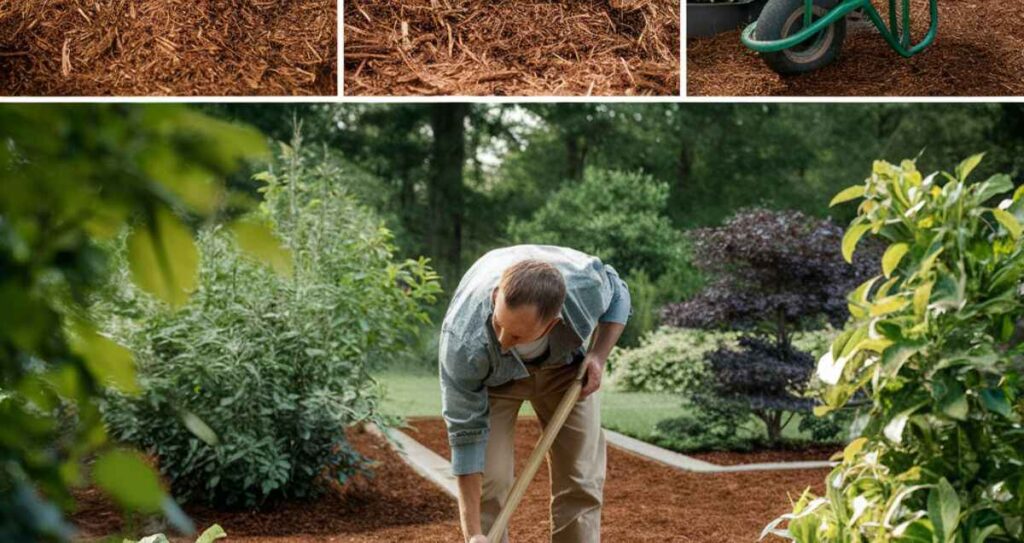
Proper mulch application is crucial for maximizing its benefits. Here are some tips:
- Timing: Apply mulch in early spring after the soil has warmed up, or in fall after the first frost. Avoid mulching during the hottest summer months.
- Depth: For most organic mulches, aim for a depth of 2-4 inches (5-10 cm) around plants and trees. Deeper layers can inhibit air and water circulation.
- Coverage: Spread the mulch evenly, ensuring it extends a few inches away from the base of plants or trees. Avoid piling mulch directly against stems or trunks, as this can lead to rot or pest infestations.
- Soil Preparation: Before Mulching, remove any existing weeds and loosen the soil to improve water and air penetration.
- Maintenance: Replenish mulch as needed, typically once or twice a year, to maintain the desired depth and effectiveness.
By following these guidelines, your mulch will provide optimal benefits while avoiding potential issues like excessive moisture retention or plant suffocation.
Mulching for Specific Garden Types
The versatility of mulch makes it a valuable addition to various garden spaces:
Also Read This Article: Home Depot Mulch Sale 5 For $10
- Vegetable Gardens: A thick layer of mulch helps retain soil moisture, reducing the need for frequent watering. It also suppresses weeds, allowing your vegetables to thrive without competition.
- Flower Beds: Mulch enhances the aesthetic appeal of flower beds while preventing soil compaction and protecting delicate blooms from splashing soil during watering or rain.
- Trees and Shrubs: Applying mulch around the base of trees and shrubs insulates their roots, retains moisture, and prevents damage from lawnmowers or string trimmers.
- Paths and Walkways: Mulching paths and walkways not only defines their boundaries but also prevents soil erosion and the growth of unwanted vegetation.
- Beyond the Basics: Advanced Mulching Techniques
As you gain experience with mulching, you may want to explore more advanced techniques:
- Sheet Mulching: This method involves layering organic materials like cardboard, compost, and mulch directly over existing vegetation to smother weeds and create new garden beds.
- Combining Mulch Types: Layering different mulches can provide additional benefits. For example, using a coarse bottom layer (like wood chips) topped with a finer material (like shredded leaves) can improve moisture retention and weed suppression.
- Erosion Control: On slopes or other areas prone to erosion, mulch can be used to stabilize the soil and prevent runoff.
- Composting: Incorporating mulch into your composting system can help maintain the ideal moisture and air levels, promoting faster decomposition and nutrient-rich compost.
Addressing Common Mulching Concerns
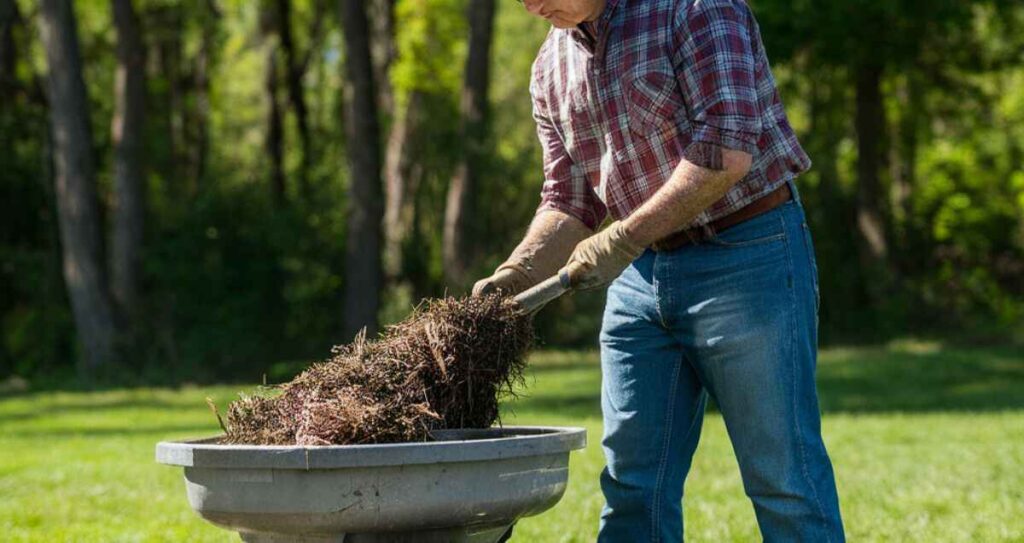
While mulching is generally safe and beneficial, there are a few potential concerns to be aware of:
- Pests and Diseases: Organic mulches can attract certain pests or harbor plant diseases if not properly managed. Ensure mulch is replenished regularly and sourced from reliable suppliers.
- Nitrogen Depletion: As wood-based mulches decompose, they can temporarily tie up nitrogen in the soil, potentially causing a deficiency in plants. This can be addressed by adding a nitrogen-rich fertilizer or incorporating a high-nitrogen material like grass clippings into the mulch.
- Flammability: Dry, organic mulches can pose a fire risk, especially during hot, dry periods. Maintain a mulch-free zone around structures and avoid piling mulch too deeply.
By being proactive and addressing these concerns, you can enjoy the many benefits of mulching without any significant drawbacks.
Frequently Asked Questions
What are the main purposes of using mulch?
Mulch is used for retaining soil moisture, suppressing weed growth, insulating the soil, and enriching the soil as organic mulches decompose.
Can mulch be used in vegetable gardens?
Yes, mulch is excellent for use in vegetable gardens to retain moisture and prevent weeds from competing with plants.
Is mulch suitable for flower beds?
Yes, mulch enhances flower beds by retaining moisture, suppressing weeds, and providing an attractive appearance.
How does mulch benefit trees and shrubs?
Mulch benefits trees and shrubs by insulating their roots, retaining soil moisture, and providing nutrients as the mulch breaks down.
Can mulch be used on slopes or hillsides?
Yes, mulch can help prevent erosion on slopes and hillsides by holding the soil in place.
Is mulch useful for pathways and walkways?
Yes, mulch is useful for creating tidy pathways and walkways while suppressing weed growth.
Can mulch be used in composting?
Yes, organic mulches like wood chips and leaves can be added to compost piles and bins.
Conclusion
Mulching is a simple yet powerful gardening technique that can transform your outdoor space into a lush, low-maintenance oasis. By selecting the right mulch for your needs and applying it correctly, you’ll reap rewards like moisture retention, weed suppression, and improved soil health.
Don’t be afraid to experiment and find the mulch that works best for your garden. Whether you opt for a classic wood chip mulch or get creative with a combination of materials, embracing this low-effort, high-impact technique will save you time and effort while creating a thriving, beautiful garden you can truly enjoy.
